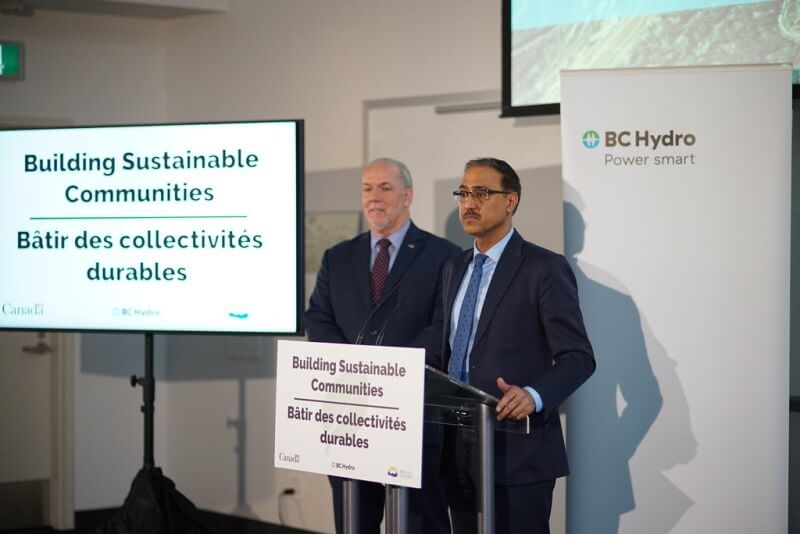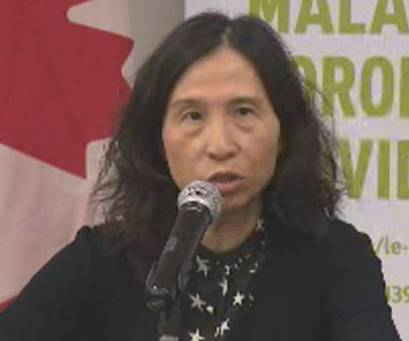The Voice of Canada News
Investing in infrastructure that brings clean electricity to Canadian businesses, including those in remote and northern communities, helps create good middle-class jobs, a low-carbon economy and greener communities.
Amarjeet Sohi, federal Minister of Natural Resources, on behalf of François-Philippe Champagne, federal Minister of Infrastructure and Communities, was joined by John Horgan, Premier of British Columbia, and Chris O’Riley, president and chief operating officer of BC Hydro, to announce federal funding for the Peace Region Electricity Supply (PRES) project.
Electricity demand in the South Peace Region is increasing due to natural gas exploration and development. To meet current and future demand, BC Hydro will expand the existing transmission infrastructure by building two parallel 230-kilovolt power lines between the future Site C Substation near Fort St. John and the existing Groundbirch Substation, located about 30 kilometres east of Chetwynd.
Once complete, industries and businesses in the Peace region will have access to a cleaner supply of energy to power their operations, reducing greenhouse gas emissions by up to 2.6 megatonnes per year.
The Government of Canada is providing up to $83.6 million for this project through the Investing in Canada Plan, while BC Hydro is providing the remaining $205.4 million.
Helping industry move to clean, renewable energy, like hydroelectricity, is part of the CleanBC climate action plan to power B.C.’s growing economy and make life better for everyone.
Quotes:
Amarjeet Sohi, federal Minister of Natural Resources –
“Transitioning to cleaner electricity is essential to protecting the environment, creating more sustainable communities and building a clean future for our kids and grandkids. This important project will encourage Canadian businesses to transition to renewable energy, boosting the economic growth in the Peace region and promoting a greener way of life for all British Columbians.”
John Horgan, Premier of British Columbia –
“Working with our federal partners, we are delivering the clean energy communities, businesses and industry need, while meeting our CleanBC goals. This investment helps B.C. build a low-carbon economy that includes all sectors and provides more opportunities for people.”
Chris O’Riley, president and chief operating officer, BC Hydro –
“We know the gas industry is a primary driver for electricity demand in the South Peace region. The PRES project will ensure we can reliably provide electricity to our industrial customers who want to power their facilities with clean energy – significantly reducing greenhouse gas emissions.”
Quick Facts:
- Budget 2019, Investing in the Middle Class, is the federal government’s plan to create more well-paying jobs, put home ownership within reach for more Canadians, help working people get the training they need to succeed, support seniors and lay the foundation for national pharmacare.
- With many municipalities across Canada facing serious infrastructure deficits, Budget 2019 includes a one-time top-up of $2.2 billion to the federal Gas Tax Fund to help address short-term priorities in municipalities and First Nations communities.
- The federal Budget 2019 builds on the Investing in Canada Plan, under which the Government of Canada is investing more than $180 billion over 12 years in community infrastructure across the country.
- $26.9 billion of this funding is supporting green infrastructure projects, including $5 billion available for investment through the Canada Infrastructure Bank.
- Investing in green infrastructure that helps communities cope with the intensifying effects of climate change is an integral part of Canada’s transition to a more resilient, low-carbon economy, which is among the commitments made under the Pan-Canadian Framework on Clean Growth and Climate Change.
- The LNG Canada project will generate $23 billion in government revenues – bringing new resources for health care, schools, child care and services for the people of B.C. It will create up to 10,000 jobs for people during construction and 950 permanent jobs in northern B.C. once operations are underway.
- BC Hydro anticipates opportunities for apprentices working on the project and procurement opportunities for small- to medium-sized businesses. The project will also provide social and economic benefits for Indigenous groups through training, employment and procurement opportunities.
- 98% of the power generated by BC Hydro is clean, renewable energy.




